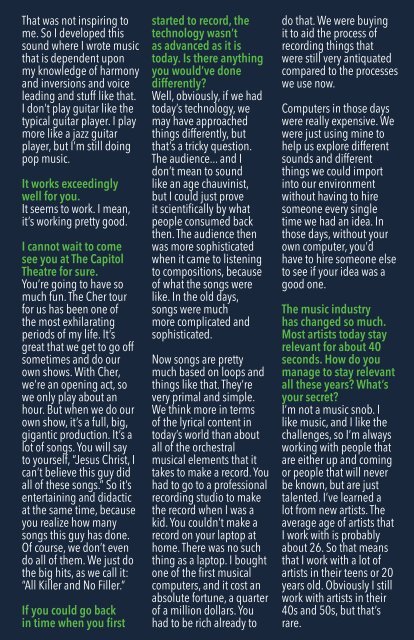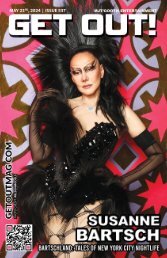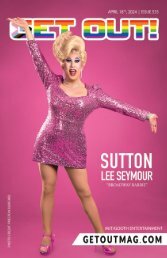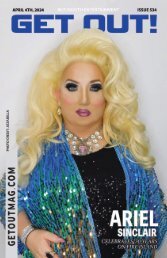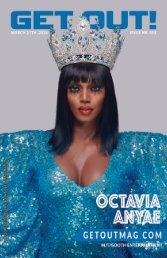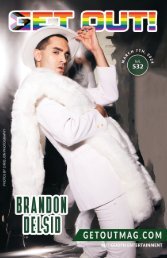Get Out! GAY Magazine – Issue 410 March 20, 2019
Featuring content from the hottest gay and gay-friendly spots in New York, each (free!) issue of Get Out! highlights the bars, nightclubs, restaurants, spas and other businesses throughout NYC’s metropolitan area that the city’s gay population is interested in.
Featuring content from the hottest gay and gay-friendly spots in New York, each (free!) issue of Get Out! highlights the bars, nightclubs, restaurants, spas and other businesses throughout NYC’s metropolitan area that the city’s gay population is interested in.
You also want an ePaper? Increase the reach of your titles
YUMPU automatically turns print PDFs into web optimized ePapers that Google loves.
That was not inspiring to<br />
me. So I developed this<br />
sound where I wrote music<br />
that is dependent upon<br />
my knowledge of harmony<br />
and inversions and voice<br />
leading and stuff like that.<br />
I don’t play guitar like the<br />
typical guitar player. I play<br />
more like a jazz guitar<br />
player, but I’m still doing<br />
pop music.<br />
It works exceedingly<br />
well for you.<br />
It seems to work. I mean,<br />
it’s working pretty good.<br />
I cannot wait to come<br />
see you at The Capitol<br />
Theatre for sure.<br />
You’re going to have so<br />
much fun. The Cher tour<br />
for us has been one of<br />
the most exhilarating<br />
periods of my life. It’s<br />
great that we get to go off<br />
sometimes and do our<br />
own shows. With Cher,<br />
we’re an opening act, so<br />
we only play about an<br />
hour. But when we do our<br />
own show, it’s a full, big,<br />
gigantic production. It’s a<br />
lot of songs. You will say<br />
to yourself, “Jesus Christ, I<br />
can’t believe this guy did<br />
all of these songs.” So it’s<br />
entertaining and didactic<br />
at the same time, because<br />
you realize how many<br />
songs this guy has done.<br />
Of course, we don’t even<br />
do all of them. We just do<br />
the big hits, as we call it:<br />
“All Killer and No Filler.”<br />
If you could go back<br />
in time when you first<br />
started to record, the<br />
technology wasn’t<br />
as advanced as it is<br />
today. Is there anything<br />
you would’ve done<br />
differently?<br />
Well, obviously, if we had<br />
today’s technology, we<br />
may have approached<br />
things differently, but<br />
that’s a tricky question.<br />
The audience... and I<br />
don’t mean to sound<br />
like an age chauvinist,<br />
but I could just prove<br />
it scientifically by what<br />
people consumed back<br />
then. The audience then<br />
was more sophisticated<br />
when it came to listening<br />
to compositions, because<br />
of what the songs were<br />
like. In the old days,<br />
songs were much<br />
more complicated and<br />
sophisticated.<br />
Now songs are pretty<br />
much based on loops and<br />
things like that. They’re<br />
very primal and simple.<br />
We think more in terms<br />
of the lyrical content in<br />
today’s world than about<br />
all of the orchestral<br />
musical elements that it<br />
takes to make a record. You<br />
had to go to a professional<br />
recording studio to make<br />
the record when I was a<br />
kid. You couldn’t make a<br />
record on your laptop at<br />
home. There was no such<br />
thing as a laptop. I bought<br />
one of the first musical<br />
computers, and it cost an<br />
absolute fortune, a quarter<br />
of a million dollars. You<br />
had to be rich already to<br />
do that. We were buying<br />
it to aid the process of<br />
recording things that<br />
were still very antiquated<br />
compared to the processes<br />
we use now.<br />
Computers in those days<br />
were really expensive. We<br />
were just using mine to<br />
help us explore different<br />
sounds and different<br />
things we could import<br />
into our environment<br />
without having to hire<br />
someone every single<br />
time we had an idea. In<br />
those days, without your<br />
own computer, you’d<br />
have to hire someone else<br />
to see if your idea was a<br />
good one.<br />
The music industry<br />
has changed so much.<br />
Most artists today stay<br />
relevant for about 40<br />
seconds. How do you<br />
manage to stay relevant<br />
all these years? What’s<br />
your secret?<br />
I’m not a music snob. I<br />
like music, and I like the<br />
challenges, so I’m always<br />
working with people that<br />
are either up and coming<br />
or people that will never<br />
be known, but are just<br />
talented. I’ve learned a<br />
lot from new artists. The<br />
average age of artists that<br />
I work with is probably<br />
about 26. So that means<br />
that I work with a lot of<br />
artists in their teens or <strong>20</strong><br />
years old. Obviously I still<br />
work with artists in their<br />
40s and 50s, but that’s<br />
rare.


